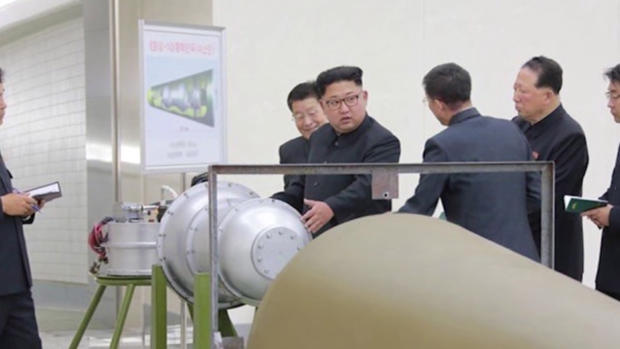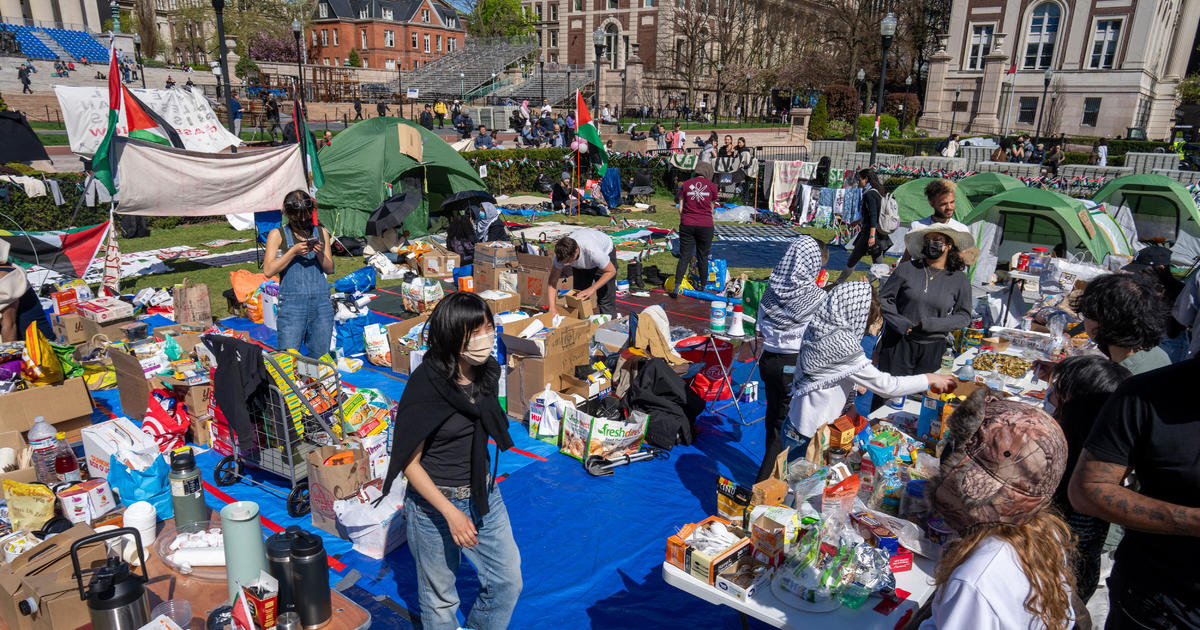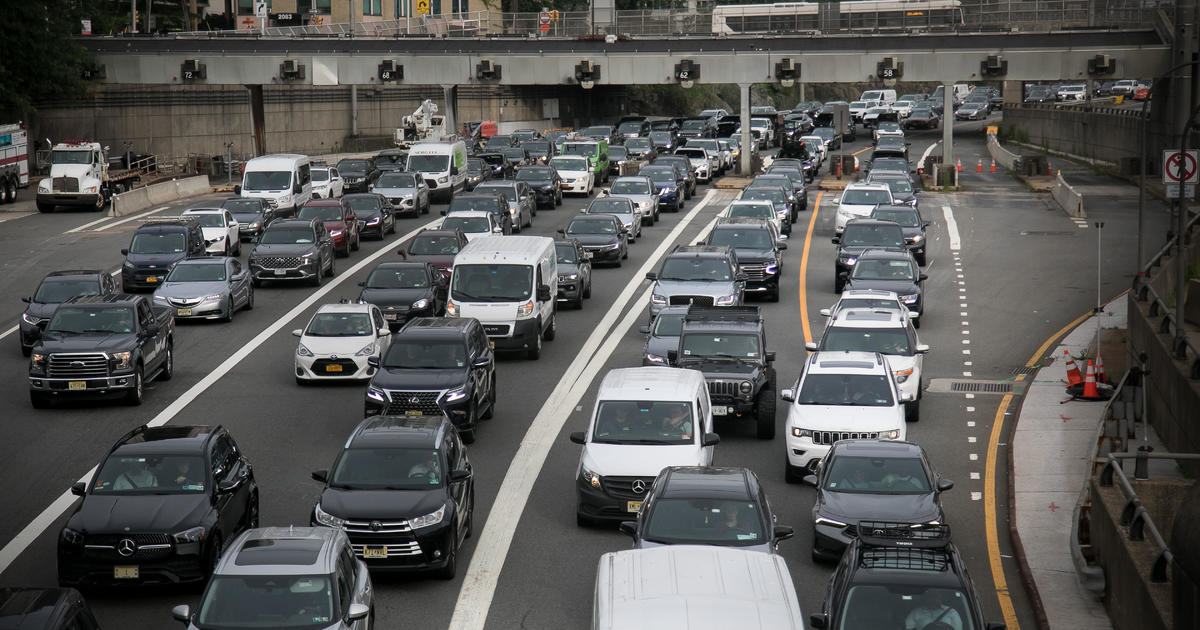Mattis Issues Warning After North Korean State Media Announces Test Of Hydrogen Bomb
WASHINGTON (CBSNewYork/CBS News/AP) -- Hours after North Korea's latest nuclear provocation, U.S. Defense Secretary James Mattis said that any threat to the U.S. "will be met with a massive military response."
"Any threat to the United States or its territories, including Guam or our allies, will be met with a massive military response -- a response both effective and overwhelming," Mattis said.
Mattis said that all members of the U.N. Security Council "unanimously agreed on the threat North Korea poses" and remain committed to the denuclearization of the Korean Peninsula.
While he said America does not seek the "total annihilation" of the North, he added, "We have many options to do so."
Mattis, who did not take questions from reporters, said he had attended a "small group" national security meeting with President Trump and others. He said the president wanted to be briefed on each of what Mattis called "many military options" for action against North Korea.
"We made clear that we have the ability to defend ourselves and our allies, South Korea and Japan, from any attacks, and our commitments among the allies are ironclad," he said.
The United Nations Security Council has also called an emergency meeting in New York following the incident in North Korea, but so far, UN sanctions have not stopped North Korea from pursuing its nuclear ambitions.
South Korea also launched a Hyunmu-2 ballistic missile during an exercise in response to the North Korean test.
North Korea announced it detonated a thermonuclear device Sunday in its sixth and most powerful nuclear test to date, a big step toward its goal of developing nuclear weapons capable of striking anywhere in the U.S. The North called it a "perfect success" in the face of near universal condemnation from across the globe.
Though the precise strength of the blast has yet to be determined, South Korea's weather agency said the artificial earthquake it caused was five to six times stronger than tremors generated by its previous tests. It reportedly shook buildings in China and in Russia.
The test was carried out at 12:29 p.m. local time at the Punggye-ri site where North Korea has also conducted past nuclear tests. Officials in Seoul put the magnitude at 5.7, while the U.S. Geological Survey said it was a magnitude 6.3. The strongest artificial quake from previous tests was a magnitude 5.3.
North Korea's state-run television broadcast a special bulletin Sunday afternoon to announce the test. It said leader Kim Jong Un attended a meeting of the ruling party's presidium and signed the go-ahead order. Earlier in the day, the party's newspaper ran a front-page story showing photos of Kim examining what it said was a nuclear warhead being fitted onto the nose of an intercontinental ballistic missile.
So far, economic sanctions and diplomatic pressure have not been enough to stop Kim Jong Un's growing nuclear program, CBS2's Brian Conybeare reported.
"He wants to demonstrate his ability to put a U.S. city at risk of a nuclear attack," former Deputy CIA Director Michael Morell said on CBS News' "Face the Nation" Sunday.
Morell said diplomacy with North Korea has failed for 25 years, and suggested another tactic short of military action.
"The other option is acceptance of this capability," he said. "Containment, deterrence – just the way we contained and deterred the Soviet Union."
President Donald Trump said Sunday on Twitter that the North's "words and actions continue to be very hostile and dangerous" to the U.S. He called it "a rogue nation which has become a great threat and embarrassment to China, which is trying to help but with little success."
China is by far the North's biggest trading partner, but Trump on Sunday appeared to be more critical of South Korean President Moon Jae-in, who has attempted to reach out to the North.
"South Korea is finding, as I have told them, that their talk of appeasement with North Korea will not work, they only understand one thing!" Trump tweeted.
When asked as he was leaving church services Sunday morning if he was planning on attacking North Korea in response to the country's most recent test, the president replied with two words; "We'll see."
Later in the day, US Defense Secretary James Mattis warned North Korea that the United States has "many" military options the president could use to deal with its nuclear arms and long-range missile programs.
Standing outside the West Wing after a "small group" meeting with Trump, Mattis said any major threat to the United States or its allies would be met with a "massive" military response that would be "overwhelming."
Sunday's detonation builds on recent North Korean advances that include test launches in July of two ICBMs that are believed to be capable of reaching the mainland United States. Pyongyang says its missile development is part of a defensive effort to build a viable nuclear deterrent that can target U.S. cities.
The North's neighbors condemned the blast immediately.
China's foreign ministry said in a statement that the Chinese government has "expressed firm opposition and strong condemnation." It urged North Korea to "stop taking erroneous actions that deteriorate the situation."
South Korea held a National Security Council meeting chaired by President Moon Jae-in. National Security Director Chung Eui-yong said Moon will seek every available measure, including new U.N. sanctions or the deployment of more U.S. military assets, to further isolate Pyongyang.
Officials in Seoul also said U.S. National Security Adviser H.R. McMaster spoke with Chung for 20 minutes in an emergency phone call about an hour after the detonation.
Japan's Prime Minister Shinzo Abe called the test "absolutely unacceptable."
The nuclear test is the North's first since U.S. President Donald Trump assumed office in January. Trump has been talking tough with the North over its stepped-up missile tests, including a comment that Pyongyang would see fire, fury and power unlike any the world had ever witnessed if it continued even verbal threats.
The North claimed the device it tested was a thermonuclear weapon -- commonly called an H-bomb. That could be hard to independently confirm. It said the underground test site did not leak radioactive materials, which would make such a determination even harder.
At the same time, the simple power of the blast was convincing. Japan's Defense Minister Itsunori Onodera said it might have been as powerful as 70 kilotons. North Korea's previous largest was thought to be anywhere from 10 to 30 kilotons.
"We cannot deny it was an H-bomb test," Onodera said. "North Korea might have successfully tested a weapon with significantly large capability."
North Korea conducted two nuclear tests last year, the last nearly a year ago, on the Sept. 9 anniversary of the nation's founding. It has been launching missiles at a record pace this year. It conducted its most provocative launch yet last month, in response to ongoing U.S.-South Korea military exercises, when it fired a potentially nuclear-capable midrange missile over northern Japan.
It said that launch was the "curtain-raiser" for more activity to come.
The photos released earlier Sunday showed Kim talking with his lieutenants as he observed a silver, peanut-shaped device that the state-run media said was a thermonuclear weapon designed to be mounted on the North's "Hwasong-14" ICBM.
The North claims the device was made domestically and has explosive power that can range from tens to hundreds of kilotons. Outside experts suggested the yield of the device tested Sunday might be in that ballpark, though closer to the lower range. For context, the bomb dropped on Hiroshima by the United States had a 15-kiloton yield.
North Korea's nuclear and missile program has made huge strides since Kim rose to power following his father's death in late 2011.
Its recent activity has been especially bold.
The North followed its two tests of Hwasong-14 ICBMs by announcing a plan to launch a salvo of intermediate range missiles toward the U.S. Pacific island territory of Guam. Kim Jong Un has reportedly signed off on the plan, but is watching the moves by the U.S. before deciding when or whether to carry it out.
North Korea flew a Hwasong-12 over northern Japan last week, the first such overflight by a missile capable of carrying nukes, in a launch Kim described as a "meaningful prelude" to containing Guam. Guam is a major sore point for Pyongyang because it is a U.S. military hub and home to a squadron of B-1B bombers, which the North fears could be used to attack their country.
The U.S. on Thursday had sent the bombers and F-35 stealth fighters to the skies of South Korea in a show of force -- and North Korea strongly protested.
Nuclear tests are crucial to perfect sophisticated technologies and to demonstrate to the world that claims of nuclear prowess are not merely a bluff.
The White House said Trump spoke with Abe regarding "ongoing efforts to maximize pressure on North Korea." But the statement did not say whether the conversation came before or after the North's latest test.
The options they have to pressure Pyongyang would appear to be limited. Further economic and trade sanctions, increased diplomatic pressure and boosting military maneuvers or shows of force would likely all be on the table.
A long line of U.S. presidents has failed to check North Korea's persistent pursuit of missiles and nuclear weapons. Six-nation negotiations on dismantling North Korea's nuclear program in exchange for aid fell apart in early 2009.
Just before the test, according to state media, Kim and the other senior leaders at the party presidium meeting discussed "detailed ways and measures for containing the U.S. and other hostile forces' vicious moves for sanctions."
Kim, according to the statement carried by the state-run Korean Central News Agency, claimed all components of the device were domestically produced, which he said means the North can make "as many as it wants."
Hans Kristensen, a nuclear weapons expert at the Federation of American Scientists, said the North probably will need to do more tests before achieving a functioning hydrogen bomb design.
Beyond the science of the blast, North Korea's accelerating push to field a nuclear weapon that can target all of the United States is creating political complications for the U.S. as it seeks to balance resolve with reassurance to allies that Washington will uphold its decadeslong commitment to deter nuclear attack on South Korea and Japan.
That is why some questioned Trump's jab Sunday at South Korea. He tweeted that Seoul is finding that its "talk of appeasement" will not work. The North Koreans, he added, "only understand one thing," implying military force might be required. The U.S. has about 28,000 troops stationed in South Korea and is obliged by treaty to defend it in the event of war.
Patrick Cronin, an Asia expert with the Center for a New American Security, said Mr. Trump's comment on South Korea was probably "intended to stiffen the spine of an ally." He said he agreed with the intention.
"I think Washington is very serious about showing some unexpected resolve," he said. "We need our ally and we need to remain ironclad. But at the same time, we can't afford South Korea to go weak in facing down this growing danger."
Trump also suggested putting more pressure on China, the North's patron for many decades and a vital U.S. trading partner, in hopes of persuading Beijing to exert more effective leverage on its neighbor. Trump tweeted that the U.S. is considering "stopping all trade with any country doing business with North Korea." Such a halt would be radical. The U.S. imports about $40 billion in goods a month from China, North Korea's main commercial partner.
Secretary of State Rex Tillerson was calling counterparts in Asia, and Trump's treasury secretary, Steven Mnuchin, said he was putting together proposed new sanctions for Trump to consider that would seek to cut off trade with North Korea.
It's unclear what kind of penalties might make a difference. Lassina Zerbo, head of the U.N. test ban treaty organization, said sanctions already imposed against North Korea aren't working.
China's official Xinhua News Agency said President Xi Jinping and Russian leader Vladimir Putin, meeting on the sidelines of a Beijing-led economic summit, agreed "to adhere to the goal of the denuclearization of the Korean Peninsula, have close communication and coordination and properly respond" to the test.
Experts have questioned whether the North has gone too far down the nuclear road to continue pushing for a denuclearization of the Korean Peninsula, an Obama administration policy goal still embraced by Trump's White House.
"Denuclearization is not a viable U.S. policy goal," said Richard Fontaine, president of the Center for a New American Security, but neither should the U.S. accept North Korea as a nuclear power. "We should keep denuclearization as a long-term aspiration, but recognize privately that it's unachievable anytime soon."
The two Koreas have shared the world's most heavily fortified border since their war in the early 1950s ended with an armistice, not a peace treaty.
About 28,500 American troops are deployed in South Korea as deterrence against North Korea.
(© Copyright 2017 CBS Broadcasting Inc. All Rights Reserved. The Associated Press contributed to this report.)




